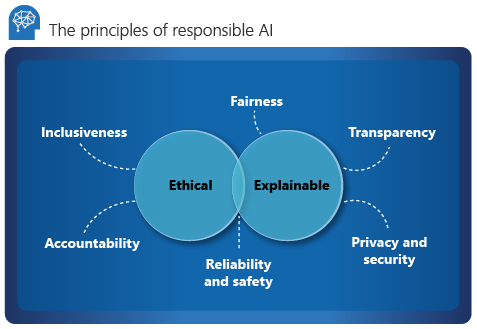Crafts of the Future: A Responsible AI Framework for B2B Services

Generated with DALL-E AI on Microsoft Copilot Designer
As Generative AI continues to revolutionize the landscape of day-to-day Users, it becomes imperative to establish a Framework that ensures its ethical and effective deployment under B2B Services too. If employed right, AI can be a game-changer for any Business regardless of size or maturity. This article delves into the emergence of Generative AI and its burgeoning role in Business-to-Business (B2B) Services, proposing a robust Framework for its responsible use for Service Providers.
It is widely believed that ‘AI will significantly accelerate economic growth over time by making workers far more efficient’. This, of course, will mean that Businesses will see increased efficiency as well. As such, in an era where Artificial Intelligence (AI) is quickly becoming not just an asset but a necessity, Businesses are rapidly integrating Generative AI technologies to stay ahead.
In a general sense, there are two (2) emerging trends: Responsible and Trustable AI. In other words, its use is to be Ethical (that is, to be morally and correctly employed in Products and Services such as not to be discriminative towards Humans), and Explainable (such that Humans can always grasp the chain of events that may have led to an outcome, whenever prompted). Things, in turn, are broken down further to serve as specific guidance. These are listed in Figure 1.

Figure 1. Responsible and Trusted AI Principles as defined by Microsoft
However, since the most intensive activity regarding AI “exploitation” happens for Businesses, as they may also have huge Capital for this, it is my consideration that there needs to be a commonly agreeable “standard” for Business-to-Business (B2B) Services. To get us there, I propose the following Principles that would serve as a foundation.
The 5 Principles (for AI usage when deployed by Service Providers)
Here are five (5) Key Principles that should underpin any Strategy for Responsible AI as it intersects with and enables a B2B context:
-
Interoperability: The cornerstone of any Generative AI application in B2B services is its ability to seamlessly integrate with existing systems. By designing AI that can communicate and exchange information with diverse business platforms, we foster an ecosystem of collaboration for the Users, and efficiency by leveraging Automation.
-
Scalability: Generative AI must be able to accommodate the dynamic nature of Business demands. Solutions should be scalable, capable of expanding in functionality without sacrificing performance or ethical integrity.
-
Value Alignment: AI behaviors must resonate with the Client’s Core Values and Business Objectives. This alignment ensures that AI decisions and actions propel the Business towards its strategic goals, reinforcing trust and reliability at a faster rate.
-
Industry-Specific Compliance: Each industry carries its own set of regulations and ethical mandates. Tailoring AI systems to conform to these specific requirements is not just a legal obligation but a moral one, ensuring that AI acts within the bounds of societal norms and without human-values discrimination.
-
Continuous Improvement: The transformative AI Journey of any Business does not end at Deployment. Ongoing evaluation and refinement, driven by User feedback and Performance metrics, are essential for maintaining relevance and ethical standards.
Following these key principles, let us examine how Generative AI can be specifically applied in two distinct industries within the B2B Services sector:
-
Marketing and Sales: In the realm of B2B marketing, Generative AI is transforming how businesses engage with their clients. In sales, generative AI is used for automated lead scoring and predictive analytics, helping sales teams prioritize their efforts and increase ROI.
-
Healthcare: The healthcare industry stands to benefit significantly from Generative AI through personalized patient care plans and predictive diagnostics. AI can analyze vast amounts of patient data to generate insights that lead to better health outcomes and streamlined operations for Healthcare providers.
These examples illustrate the potential of Generative AI to enhance industry-specific processes while adhering to the principles of Responsible AI usage in a B2B context.
In addition to the Industries previously mentioned, let us consider the role of Generative AI within Managed Services. Coincidentally, this also intersects with my current Professional context where I am a Stakeholder for an ITSM Solution aimed at enabling a B2B Managed Services Support for a strategic subset of Member Firms in our group.
Particularly focusing on Cloud Engineering, Managed and Support Services, we can divide the problem between:
-
Cloud Engineering: Generative AI is playing a pivotal role in automating Cloud Infrastructure design and management. For example, AWS Managed Services (AMS) utilizes AI to provide operational excellence in the cloud, offering services like incident management, security, patch, backup, and cost optimization. This not only enhances security and efficiency but also reduces operational costs by an average of 10-15% annually.
-
Managed Services Support: AI-driven support services are revolutionizing the way managed services respond to client needs. For instance, AI-powered Chatbots provide customer support that understands and responds to user intent, improving customer satisfaction and efficiency. A case study from Trianz highlights the use of AI for routine tasks such as EBS snapshot backups for disaster recovery, managing role-based access controls, and log aggregation and reporting. These AI-powered processes ensure high availability and resiliency, crucial for maintaining uninterrupted business operations.
Above examples, while by no means exhaustive, underscore the transformative impact of Generative AI in Managed Services, aligning with the principles of interoperability, scalability, value alignment, industry-specific compliance, and continuous improvement.
Ethical considerations
As we embrace the transformative impact of Generative AI in Managed Services, it is essential to address the following ethical considerations to ensure responsible usage:
- Content Control: Implementing mechanisms to prevent the creation of harmful or offensive content.
- Data Accuracy: Ensuring the integrity of data to prevent the spread of misinformation.
- Intellectual Property: Respecting copyrights and avoiding infringement.
- Data Privacy: Protecting personal information and adhering to privacy regulations.
- Bias Monitoring: Striving for unbiased AI by using diverse datasets and continuous bias evaluation.
- Human-AI Collaboration: Augmenting human skills with AI, rather than replacing jobs.
- Operational Transparency: Providing explainability features for AI decisions.
- Regulatory Compliance: Designing AI systems that comply with industry-specific laws and guidelines.
These ethical considerations are integrated into the Framework described above and can be used to govern Generative AI deployment in Managed Services, while aligning with the principles of interoperability, scalability, value alignment, industry-specific compliance, and continuous improvement. By adhering to these guidelines, businesses can leverage the power of AI responsibly, fostering innovation that is conscientious and sustainable.
Further discussion
Building a comprehensive Framework for the responsible use of Generative AI in B2B Services is an ongoing process that requires continuous refinement. Here are three (3) future topics of discussion or research that could further enhance the Framework:
-
AI Explainability in Complex Systems: As AI systems become more complex, ensuring their decisions are understandable to end-users remains a challenge. Future research could focus on developing standards and techniques for explainability in AI, particularly in scenarios involving high-stakes decision-making.
-
Impact of AI on Employment and Skill Development: Regarding Social Benefits, the deployment of AI in managed services will inevitably change the Jobs landscape. It’s important to explore how AI can augment human work without causing significant job displacement, and how to upskill the workforce to prepare for an AI-integrated future.
-
Global AI Governance and Policy Alignment: With the rapid advancement of AI technologies, there is a need for a cohesive global Governance structure that ensures ethical standards are maintained across borders. Research into how different regions can align their AI policies to promote a unified approach to AI governance could be beneficial.
These topics aim to address some of the broader implications of AI integration into B2B Services and ensure that the development of AI continues to be aligned with human values and ethical principles.
Conclusion
The usage of Generative AI in B2B services holds immense potential. By adhering to the principles of interoperability, scalability, value alignment, industry-specific compliance, and continuous improvement, Businesses can harness the power of AI responsibly, paving the way for innovation that is not only cutting-edge but also conscientious and sustainable. The Framework presented here aims to guide Businesses in navigating the complexities of AI deployment while upholding the highest standards of ethical Business practices.
Until the next one…

